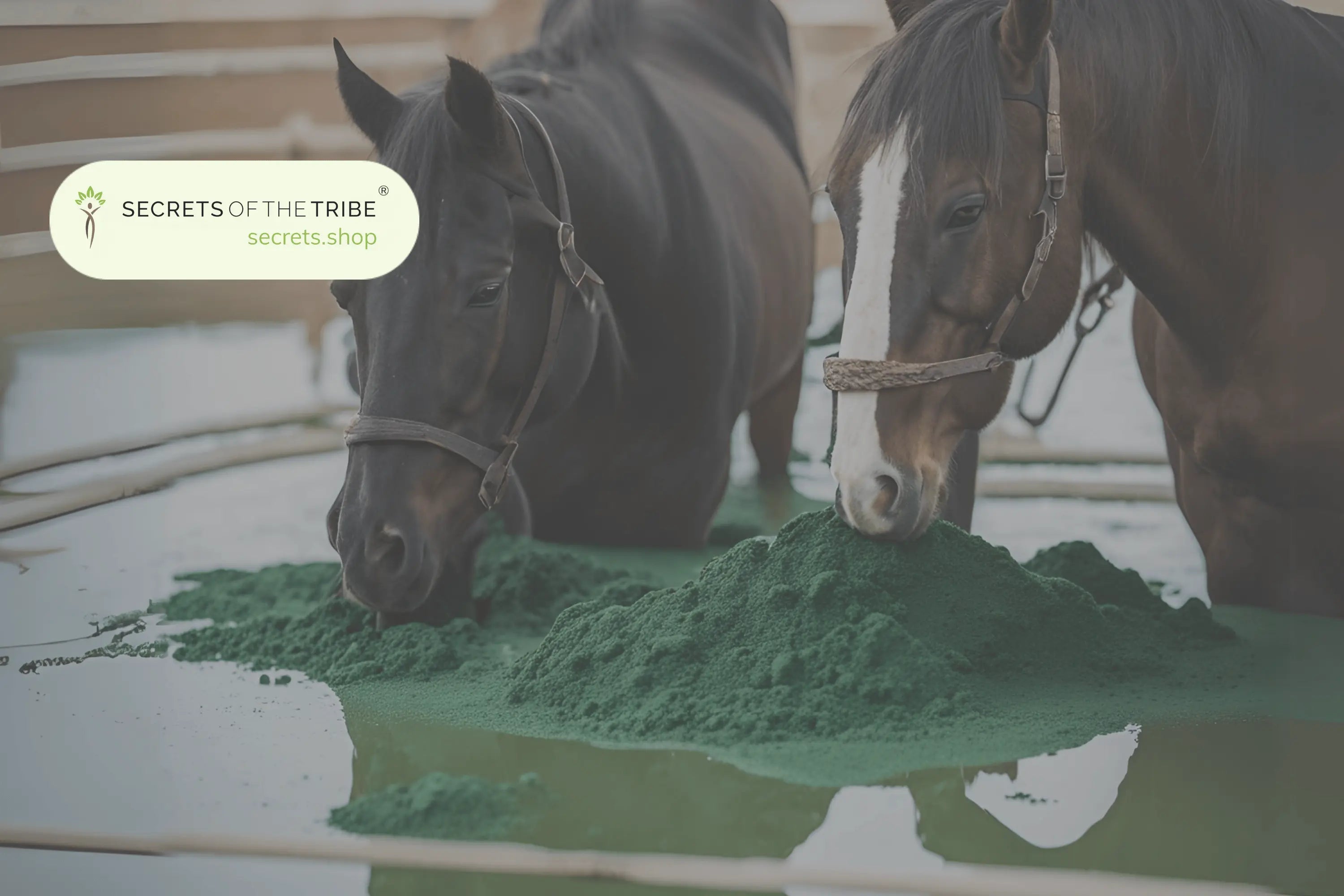Discover the power of organic spirulina for horses—a natural blue-green algae packed with antioxidants and allergy-fighting benefits for equine health.
Have you ever heard the saying, "Let food be thy medicine"? Horse owners and enthusiasts are always looking for ways to keep their equine friends healthy and happy. While modern veterinary care is essential, sometimes the answer to a horse’s well-being lies in the simple, natural remedies that have been around for centuries—herbs for horses.
Enter spirulina (Arthrospira platensis), a tiny algae that packs a powerful punch for horse health. This superfood has been around for billions of years, surviving and thriving in some of the harshest conditions on Earth. It's no wonder that spirulina has been used for centuries as a natural remedy for humans and animals alike.
But what exactly is spirulina, and where does it come from? This algae is a type of cyanobacteria that grows naturally in warm, alkaline lakes and ponds. It's been dubbed a "miracle from the sea" due to its incredible nutrient profile, which includes essential amino acids, vitamins, minerals, and powerful antioxidants. Thanks to these effects, people often compare it with another alga, chlorella vs spirulina.
Horse owners know their equine companions have unique nutritional needs that require special attention. And herbs for horses are one of the safest ways to address those needs. While a balanced diet of hay, grass, and grains is essential, sometimes our horses need a little extra support to maintain optimal health. That's where natural remedies like spirulina for horses come in.

Spirulina for Horses Alleviates Allergies
Is your horse constantly battling seasonal allergies? It's heartbreaking to see your beloved equine friends suffering from itchy skin, runny nose, and watery eyes. While there are many conventional treatments available, they often come with unwanted side effects. But what if we told you that there's a natural solution to alleviate your horse's allergies without the harsh chemicals? You guessed it, we’re talking about spirulina for horses.
So, how exactly does spirulina help reduce allergic reactions in horses? The secret lies in its ability to modulate the immune system. You see, when your horse comes into contact with an allergen, their immune system goes into overdrive, releasing histamine and other inflammatory substances that cause allergy symptoms.
A key way spirulina reduces allergic reactions is through its anti-inflammatory properties. Inflammation is at the root of many allergic responses, and spirulina is packed with powerful compounds like phycocyanin that can help reduce inflammation throughout the body. This minimizes the release of histamine and other inflammatory substances that trigger allergy symptoms.
Spirulina for Horses Improves Exercise Performance
Our equine partners are athletes in their own right. Whether racing around a track, jumping over obstacles, or performing dressage moves, horses need the right fuel to keep them going. And that's where spirulina for horses comes in. Spirulina is an excellent source of nutrients that can help enhance your horse's athletic performance and support their muscle recovery.
First and foremost, spirulina is known for its ability to increase stamina, boost energy, and reduce fatigue. This is because it’s rich in antioxidants and anti-inflammatory compounds to help combat oxidative stress and inflammation during intense exercise. One study found that spirulina improved exercise performance in horses with recurrent respiratory problems. Administering 20 g of Spirulina and 2000 mg of jiaogulan twice daily resulted in normalized respiratory recovery after moderate exercise. This enhanced race times while boosting alertness, energy levels, and enthusiasm for work.
This amazing algae is also a powerful supporter of muscle recovery and endurance. You see, spirulina is rich in iron and other essential nutrients that promote the production of red blood cells. Red blood cells are responsible for carrying oxygen throughout the body, and the more red blood cells your horse has, the more oxygen their muscles can receive. This means your horse can work harder for longer periods without feeling fatigued.
Spirulina also contains essential amino acids, which are the building blocks of protein. Protein is crucial for repairing and rebuilding muscle tissue after exercise, and spirulina's amino acid profile is similar to that of other high-quality protein sources like eggs and meat.

Spirulina for Horses Supports Weight Loss in Horses with EMS
Let's talk about keeping our equine friends at a healthy weight. As much as we love to spoil our horses with treats and lush pastures, sometimes too much of a good thing can lead to serious health problems, like Equine Metabolic Syndrome (EMS).
EMS is a condition that affects the way our horses process and store energy from their food. Horses with EMS often have insulin resistance, which means their bodies don't respond properly to insulin, the hormone that regulates blood sugar levels. This can lead to high blood sugar, obesity, and a host of other health problems like laminitis and founder.
But don't worry—there's hope in the form of spirulina for horses. This amazing algae has been shown to have powerful effects on weight management and insulin sensitivity in horses.
Spirulina is low in sugar and high in fiber, meaning it can help regulate blood sugar levels and metabolic health, keeping our horses full and satisfied. This is important because horses with EMS often have difficulty controlling their appetite and may overeat if given the chance. One study showed that horses receiving spirulina supplements exhibited reduced cresty neck scores, decreased fasting insulin levels, and enhanced glucose tolerance. Enhancing insulin sensitivity may help avert the onset of laminitis (hoof inflammation) and chronic lameness in horses.
Spirulina for Horses and its Powerful Antioxidant Effect
Antioxidants are like tiny superheroes that travel through the body, fighting off harmful substances called free radicals. Free radicals are unstable molecules that can damage cells and contribute to inflammation and oxidative stress. Over time, this damage can lead to a host of health problems, from premature aging to chronic health issues.
But here's the good news—we can help our horses fight off free radicals by feeding them plenty of antioxidants in their diet. And one of the best sources of antioxidants is spirulina for horses.
Spirulina is packed with powerful antioxidants like phycocyanin and beta-carotene, which work together to neutralize free radicals and prevent oxidative damage in the body. Phycocyanin has powerful anti-inflammatory and neuroprotective effects, while beta-carotene is a precursor to vitamin A, which is essential for healthy skin, eyes, and immune function.
By reducing oxidative stress and inflammation in the body, spirulina can help support your horse’s overall health and well-being. Studies suggest that spirulina may benefit horses experiencing sluggish recovery by enhancing their antioxidant status.

Spirulina for Horses and Their Respiratory Function
If you've been around horses for a while, you've probably heard of some common respiratory issues that can affect our equine friends, like IAD and EIPH. These conditions can be a real bummer for our horses, leading to coughing, wheezing, and even lung bleeding during intense exercise.
Traditionally, veterinarians have turned to medications like clenbuterol or corticosteroids to help manage these respiratory issues and support exercise recovery. But while these drugs can be effective, they can also come with some pretty nasty side effects, like increased heart rate, tremors, and even muscle wasting.
But what if we told you that spirulina for horses was a natural alternative to these medications that could help support your horse's respiratory health without all the scary side effects?
A key benefit of spirulina is its ability to reduce inflammation in the body. Inflammation is a major contributor to respiratory issues like IAD and EIPH, so by reducing inflammation, spirulina can help keep your horse's airways healthy and functioning properly.
Discover the Power of Spirulina for Horses
Spirulina has been used for centuries as a natural supplementation for humans and animals, and recent research has only confirmed what our ancestors already knew—that this tiny algae is a true superfood! Algae’s benefits for humans and role in nature have been heavily studied.
If you're intrigued about adding spirulina supplementation to your horse's diet, we highly encourage you to explore high-quality products like the extracts from Secrets of the Tribe. Our spirulina supplements are carefully crafted using only the purest ingredients so you can confidently uphold your pet’s wellbeing with herbal care. As always, consult your veterinarian before changing your horse's diet or healthcare routine. And if you’re wondering how to know if your pet is sick, we have some tips for you.
Secrets of the Tribe is a family owned and operated US business delivering natural herbal health solutions. Our goal is to support your health naturally. Come join our family!
FAQ on Spirulina:
|







Share:
Top 4 Herbs for Horses: A Comprehensive Guide to Herbal Supplements for Equine Wellness
What Is the Best Horse Joint Supplement? Top 4 Equine Joint Supplements